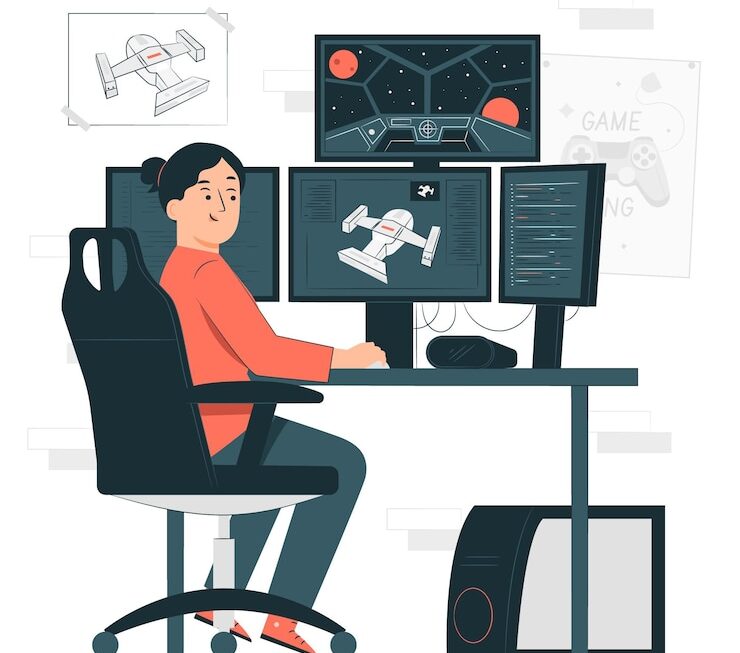Mobile Game Development Process – A Detailed Guide
- 1 What is a Mobile Game?
- 2 Steps to Build a Successful Mobile Game
- 2.1 Step 1: Have an Idea
- 2.2 Stage 2: Planning and Research
- 2.3 Step 3: Create a Prototyping Framework
- 2.4 Stage 4: Development Begins
- 2.5 Stage 5: Design Creatively
- 2.6 Stage 6: Implementation and Testing
- 2.7 Stage 7: Publishing and Marketing!
- 3 Conclusion
- 4 FAQs about Mobile Game Development
If you want to develop a mobile game app, you’ve come to the right place!
This post will provide a detailed guide on the mobile game development process from start to finish.
We’ll explain the various stages of game development, discuss the essential tools and technologies you’ll need, and provide tips on making your game stand out.
So whether you’re a beginner or an experienced developer, read on for information that will help you get started!
What is a Mobile Game?
A mobile game is an application or game that can be played on phone or tablet devices. Examples include PubG, Angry Birds, Fruit Ninja, and Temple Run.
Mobile gaming has become extremely popular over the past few years, with billions of dollars being spent on mobile games each year.
The trend shows no sign of slowing down—in fact, analysts predict that mobile gaming will generate more revenue than desktop gaming by 2025!
Why Develop a Mobile Game?
There are plenty of reasons to develop a mobile game – some obvious and some not so apparent.
Some prominent benefits of developing a mobile game include that they’re straightforward to deploy and update – you can push out new updates to your players without fuss.
Additionally, mobile games are perfect for short bursts of entertainment. They’re great for when someone needs a break from work or socializing and can be played in small doses so people don’t get addicted.
Last but not least, mobile games are hugely popular. There is an ever-growing community of gamers who love nothing more than trying out new games!
Now that we know why to develop a mobile game, let’s examine the different stages of game development.
Steps to Build a Successful Mobile Game
Step 1: Have an Idea
First and foremost, you need to have a game app idea for your project. What are you hoping to achieve with it? Do you want to create a new genre of game or take on a popular franchise?
Once you’ve determined what kind of game you want to create, the next step is finding out as much information as possible about the market. What are the best-selling mobile games currently? What genre of game do consumers seem to be gravitating towards the most? And so on.
Stage 2: Planning and Research
The second stage of game development is planning and research. During this stage, you’ll need to decide what type of mobile game you want to develop, as well as determine the mechanics and gameplay elements required.
This will also involve crunching the numbers—figuring out how many features your game will integrate to produce, as well as estimating how many players it can realistically attract.
Once you have a good understanding of these factors, it’s time to start gathering resources!
Step 3: Create a Prototyping Framework
Now that you know what kind of game you want to create, it’s time to put together a prototyping framework. This will help you determine how much effort and resources are necessary to complete your project.
The goal is to develop an efficient prototype that accurately reflects your final product—after all, this is going to be used as your guide while developing the game itself.
Stage 4: Development Begins
Development is where all the hard work begins – developing the game mechanics, designing the art and graphics, and creating a functioning platform.
This stage can be highly time-consuming, but it’s essential if you want your mobile game to stand out from the crowd.
Make sure to keep track of your progress – you never know when a critical bug may pop up that needs fixing ASAP!
Research existing games in this genre before starting development. This will help you identify which features are required for your game to be successful.
Stage 5: Design Creatively
The crucial stage of game development is designed creatively.
During this stage, you’ll decide on the look and feel of your game and create original concept art and gameplay ideas.
This is where many games stumble – if the design team isn’t passionate about their project, it will show in the final product. Make sure to give yourselves plenty of time for this stage!
This stage is also vital if you want your mobile game to look authentic and polished. Additionally, it’s essential to consider player feedback during this stage – ensuring all features are easy to access and use without overwhelming players with too many options.
Stage 6: Implementation and Testing
Now that the design is finished, it’s time to put everything into action.
This involves testing the game mechanics and ensuring that they work as intended, as well as creating user interface designs and artwork.
Once all of these aspects are finalized, it’s off to implementation – where you’ll build your mobile game!
Allocate ample time for this stage, as mistakes during implementation can easily lead to frustrating gameplay experiences.
Stage 7: Publishing and Marketing!
Thankfully, all of the hard work has paid off – now it’s time to publish and market your game!
This may seem like an arduous process, but with a bit of luck and dedication, you should be well on your way to becoming a successful developer.
Allocate adequate time for marketing your gaming; reaching the wider public can be challenging without proper advertising.
Conclusion
Now that you know everything about the mobile game development process, it is time to take action. Create an exciting idea, and then start working on your dream project.
A successful mobile game can bring in millions of dollars for its developer. Bolder, more innovative games will attract more users, too! So, what are you waiting for?
If you want to develop a top-notch gaming app, you can hire an experienced mobile game development company with a successful track record.
FAQs about Mobile Game Development
1. How long does it usually take to develop a mobile game?
This can vary widely, depending on the size and complexity of the project. However, many games take about two months to complete from start to finish. Also, how fast they can polish and release a game varies from company to company. So, it’s hard to give an exact timeframe.
2. What are the most critical factors when developing a mobile game?
Quality over Quantity—Ensure that your product is of high quality to attract users and earn good reviews. This will also help keep your players returning for more games, thus increasing revenue potential.
Prioritize User Interface & Gameplay—These are two key areas that must be well-designed to provide an enjoyable gaming experience for users. Furthermore, these elements must be efficient to keep users engaged and make the game run smoothly.
Balance Timing & Mechanics – Ensuring that all gameplay mechanics work well together is essential for a balanced experience. This will help prevent frustrating moments for players and promote continued engagement with your title.
In addition, timely pacing is essential so that users don’t forget to feel restless before their next play session.
Organize Art Assets Properly—Poor game artwork can significantly damage the user experience of your game, resulting in negative reviews and lost player returns. Make sure to manage artwork files properly to reduce the likelihood of errors and ensure a high-quality presentation.
3. Do you have any advice for smaller developers just starting?
Yes, there are several important things that small developers need to consider when developing a mobile game.
Primarily, developers should focus on creating a quality product that will be judged on its own merits.
Additionally, it is essential to carefully consider the user interface and gameplay mechanics to create an enjoyable gaming experience.
Furthermore, developers should take into account player pacing when organizing art assets so that they do not become tedious or frustrating for users.
Finally, small developers should ensure proper documentation throughout the development process to provide helpful support later on.


















